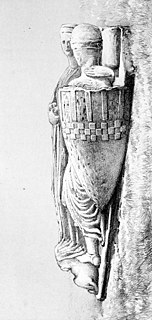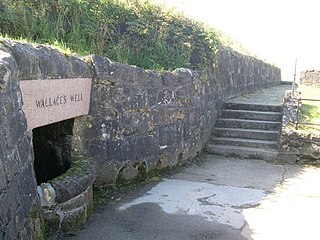Related Research Articles

Sir William Wallace was a Scottish knight who became one of the main leaders during the First War of Scottish Independence.

Menteith or Monteith, a district of south Perthshire, Scotland, roughly comprises the territory between the Teith and the Forth. Earlier forms of its name include Meneted, Maneteth and Meneteth.

Robert Stewart, Duke of Albany was a member of the Scottish royal family who served as regent to three Scottish monarchs. A ruthless politician, Albany was widely regarded as having caused the murder of his nephew, the Duke of Rothesay, and brother to the future King James I of Scotland. James was held in captivity in England for eighteen years, during which time Albany served as regent in Scotland, king in all but name. He died in 1420 and was succeeded by his son, Murdoch Stewart, Duke of Albany, who was executed for treason when James returned to Scotland in 1425, almost causing the complete ruin of the Albany Stewarts.

The Mormaer or Earl of Menteith was the ruler of the province of Menteith in the Middle Ages. The first mormaer is usually regarded as Gille Críst, simply because he is the earliest on record. The title was held in a continuous line from Gille Críst until Muireadhach IV, although the male line was broken on two occasions. A truncated version of the earldom was given two years later to Malise Graham, 1st Earl of Menteith, in compensation for loss of the Earldom of Strathearn, which was a likely result of the execution of the Duke of Albany.

Murdoch Stewart, Duke of Albany was a leading Scottish nobleman, the son of Robert Stewart, Duke of Albany, and the grandson of King Robert II of Scotland, who founded the Stewart dynasty. In 1389, he became Justiciar North of the Forth. In 1402, he was captured at the Battle of Homildon Hill and would spend 12 years in captivity in England.
A Legend of Montrose is an historical novel by Sir Walter Scott, set in Scotland in the 1640s during the Wars of the Three Kingdoms. It forms, along with The Bride of Lammermoor, the 3rd series of Scott's Tales of My Landlord. The two novels were published together in 1819.
Walter Steward of Dundonald was 3rd hereditary High Steward of Scotland and Justiciar of Scotia.

Sir John de Graham of Dundaff was a 13th-century Scottish noble. He was killed during the Battle of Falkirk on 22 July 1298.
Walter Comyn, Lord of Badenoch was the son of William Comyn, Justiciar of Scotia and Mormaer or Earl of Buchan by right of his second wife.
Maire inghean Mhuireadhaich or Mary, daughter of Muireadhach II, Mormaer of Menteith, was Countess of Menteith, successor to her sister Isabella (Iosbail). She inherited the title from her father, and married Walter Bailloch, son of Walter Stewart, 3rd High Steward of Scotland. By the time of the death of Walter Comyn, Lord of Badenoch, jure uxoris Earl of Menteith in 1258, she may have already been married. In 1260, Isabella was arrested, along with her new husband, an English knight called John Russell, for the poisoning of her late husband; by the month of April 1261, Walter and Mary were ruling the province as Count and Countess.
Muireadhach III, Earl of Menteith was a Scottish nobleman.

Walter Bailloch, also known as Walter Bailloch Stewart, was distinguished by the sobriquet Bailloch or Balloch, a Gaelic nickname roughly translated as "the freckled". He was the Earl of Menteith jure uxoris.
Alexander of Menteith, a Scottish nobleman and member of the Stewart family, he was the Earl of Menteith.
Malise Graham was a 15th-century Scottish magnate, who was the heir to the Scottish throne between 1437 and 1451, if Elizabeth Mure's children were not counted as lawful heirs.

Sir Walter de Haliburton, 1st Lord Haliburton of Dirleton, Lord High Treasurer of Scotland was a Scottish noble.

The Stuart-Menteth Baronetcy, of Closeburn in the County of Dumfries and Mansfield in the County of Ayr, is a title in the Baronetage of the United Kingdom. It was created on 11 August 1838 for Charles Stuart-Menteth. The third baronet was a naturalised American.
The Turnberry Band, also known as the Turnberry Bond, was a pact between Scottish and Anglo-Irish nobles signed on 20 September 1286 at Turnberry Castle, Ayrshire, Scotland. The agreement may have concerned a campaign in Ireland, and may have later formed the basis that bound the group around the claim of the Bruce family to the Scottish throne.

Sir John Menteith of Ruskie and Knapdale was a Scottish nobleman during the Wars of Scottish Independence. He is known for his capture of Sir William Wallace in 1305 and later joined with King Robert I of Scotland and received large land grants in Knapdale and Kintyre for his service. He is described as "guardian" of the Earldom of Menteith, as his great-nephew Alan II, Earl of Menteith was a minor at the time of the death of Alan I, Earl of Menteith.

Sir Andrew de Leslie, Lord of Leslie was a 13th-14th century Scottish noble. He was a signatory of the Declaration of Arbroath in 1320. He died c. 1324.

Wallace's Well or Auchinleck Well is a historic well which in present times is a monument and tourist attraction, located on Langmuirhead Road near Robroyston in the City of Glasgow, Scotland. William Wallace is said to have drunk from the well whenever he visited the area and also just before his capture by English troops commanded by Sir John Mentieth.
References
- ↑ Scott, Sir Walter; Lake, J. W. (1 January 1838). The Poetical Works of Sir Walter Scott: With a Sketch of His Life. J. Crissy.
- ↑ "Menteith Traitor". www.thesocietyofwilliamwallace.com.